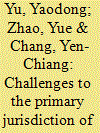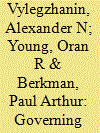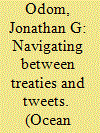|
|
|
Sort Order |
|
|
|
Items / Page
|
|
|
|
|
|
|
| Srl | Item |
| 1 |
ID:
158404


|
|
|
|
|
| Summary/Abstract |
With the increasing emergence of substandard ships sailing under the flag state's ineffective control and the growing number of accidents that negatively affect the marine environment and the maritime order, port states, coastal states, and international organizations have begun to develop new regimes to increase their control over ships. As a result, the authority of flag states is increasingly being challenged, seemingly calling into question the primary jurisdiction and control of flag states over their ships. The aim of this article is to promote a better understanding of the relationship between flag state, coastal state, and port state control.
|
|
|
|
|
|
|
|
|
|
|
|
|
|
|
|
| 2 |
ID:
158402


|
|
|
|
|
| Summary/Abstract |
The Barents Sea is an ecopolitical region bounded on the south by the north coasts of Norway and Russia, on the east by the 38th meridian, on the north by the Central Arctic Ocean, and on the west by the boundary of the Svalbard Fishery Protection Zone. The fact that much of this region has been largely ice free in modern times differentiates it from the rest of the maritime Arctic and has drawn the attention of both resource users and policymakers to the region. Norway and Russia, the key players in the Barents Sea Region, have developed a cooperative relationship in managing the shared natural resources of the region. Nevertheless, other states have interests in the region. Issues of governance in the Barents Sea Region involve growing needs for improved mechanisms to address the interplay among various elements of the complex of sectoral regimes applicable to the region and for agility in responding to rapid changes in the biophysical and socioeconomic conditions prevailing in the region.
|
|
|
|
|
|
|
|
|
|
|
|
|
|
|
|
| 3 |
ID:
158401


|
|
|
|
|
| Summary/Abstract |
In contemporary international discourse about maritime freedom (e.g., “freedom of navigation”), nations often speak in generalities, but rarely clarify what they mean. To reduce the risk of misunderstanding, nations should navigate their use of language between two purposes simultaneously. First, any discussion should be concise, communicable, and comprehendible. Additionally, nations should also be prepared to dialogue on these matters in greater depth and detail, and any substantive discussion should be faithful to the applicable international law that binds nations. A way to ensure such discourse is meaningful is by following a three-step process of labeling, framing, and applying. This article details this approach.
|
|
|
|
|
|
|
|
|
|
|
|
|
|
|
|
| 4 |
ID:
158403


|
|
|
|
|
| Summary/Abstract |
Voisinage arrangements allowing mutual and reciprocal cross-boundary fishing practices in inshore waters exist throughout the world. In the case of the island of Ireland, the practice between Irish and Northern Irish fishermen was articulated in an exchange of letters between Northern Ireland and the Republic of Ireland in the mid-1960s, the terms of which proved later to be incomplete, unpublicized, and to be overtaken by subsequent changing fishery practices. The problem over voisinage rights for Northern Irish fishermen in Irish waters culminated in litigation by Irish mussel-seed fishermen before the Irish Supreme Court. In 2016 the Court found the existing arrangement to be deficient in Irish domestic law. This has necessitated amending legislation, which is presently proceeding through the Irish parliament.
|
|
|
|
|
|
|
|
|
|
|
|
|
|
|
|
|
|
|
|
|